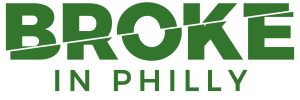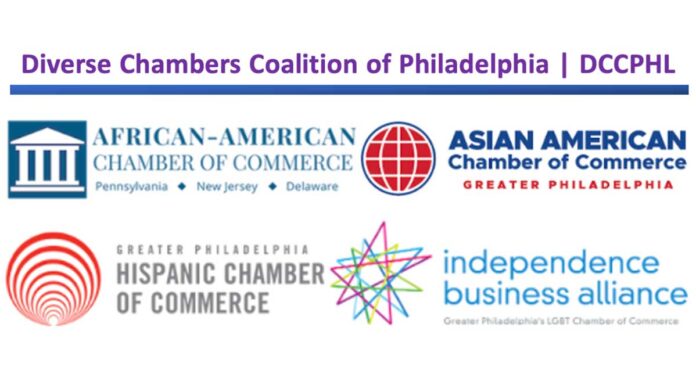In efforts to strengthen and advocate for minority-owned businesses in the Philadelphia region, the Diverse Chambers Coalition of Philadelphia (DCCPHL) have announced an official partnership. The coalition is made up of the Independence Business Alliance (IBA), also known as the LGBTQ+ Chamber of Commerce of Greater Philadelphia; the African American Chamber of Commerce of PA, NJ and DE; the Asian American Chamber of Commerce of Greater Philadelphia; and the Greater Philadelphia Hispanic Chamber of Commerce.
Prior to the formal partnership, leaders of the four chambers have been meeting over the last couple of years to discuss issues that impact minority-owned businesses in the region and ways chamber leadership could support each other.
“Diverse small businesses are the backbone of our communities, but they often feel powerless,” Jennifer Rodriguez, president and CEO of the Greater Philadelphia Hispanic Chamber of Commerce, said in a press release. “Bringing the diverse chambers together through this coalition will enable us to be more effective in advocating for the policies and resources that will help small diverse businesses thrive.”
Although the chambers of commerce that comprise the coalition remain self-governing, they plan to speak up and advocate for issues on which they unanimously agree, said Zach Wilcha, executive director of the IBA.
“We thought it would be interesting for us to explore the model of what a chamber coalition would look like for the city of Philadelphia for diverse chambers, especially as we saw that a lot of decisions were being made at levels around small businesses without us,” Wilcha said. “We knew that we had to be part of those conversations.”
For a couple of consecutive years, the diverse chambers collaboratively produced an event for Minority Enterprise Development Week, which celebrates local minority-run businesses and facilitates resources for business-owners. As the diverse chamber leaders began to discuss collaborating on more events, “that’s when these meetings really became a starting point for conversations around what an actual coalition would look like,” Wilcha added.
The diverse business owners that the DCCPHL represent contribute upwards of $3 trillion annually to the U.S. economy, according to a press release.
“Our four chambers put together are the majority of the businesses and the population of the city of Philadelphia,” said Narasimha Shenoy, founder and chairman of the Asian American Chamber of Commerce. “During COVID, I think we learned that each of us have unique issues and problems. I know the Philadelphia chamber is doing a lot of things around the general businesses, but they really don’t know the issues affecting our businesses — we do. We need a seat at the table to bring these issues up.”
One issue on which the members of the coalition will establish a unified opinion is the competing legislation in the Philadelphia City Council regarding whether outdoor dining in Philadelphia will be permanent, Wilcha said.
More broadly, crime in Philadelphia is another issue that affects the membership of all four chambers of the coalition, said Regina Hairston, CEO and president of the African American Chamber of Commerce of PA, NJ and DE.
“If we’re looking to attract customers and clients and have that foot traffic for our brick and mortar businesses, people need to feel safe in order to do that,” Hairston said.
She cited the Business Income and Receipts Tax [BIRT] as another issue impacting minority businesses in Philadelphia. Nearly half of respondents of the 2021-22 PHL Budget Cycle Survey said BIRT would be the most burdensome tax in the city, Al Día reported.
The need to ensure that minority business owners can keep their businesses operating smoothly and know how to navigate the system are additional issues that all four chambers have to contend with, Hairston said.
“If you’re a small business, more often than not, you do not have the ability to spend all day down at City Hall to get your licenses, to pay your taxes,” she explained. “That is what we do as a coalition, to make sure that we are advocating for seamless business in the city so our members can go about the business of doing their business.”
Ensuring that the region’s diverse businesses are getting some of the pandemic relief funding proves another shared interest of the coalition.
“We need to make sure that as the City is talking about equitable growth, that that is actually reaching our members,” Hairston said. “There have been systematic barriers in place that keep our Black businesses from growing, [including] access to capital, being able to apply for funding, loans and getting an equitable rate based on your profile and not based on barriers.”
So far, the collaborative nature of the coalition has perpetuated deeper mutual understanding of the communities that the partnered chambers serve, Wilcha said.
“I think that’s especially important for LGBTQ+ communities because we really do run through every single demographic and every single ethnic and racial background. I think that when people start to understand LGBTQ+ communities as part of other diverse communities, that can only be good for us. If we’ve learned nothing else over this incredibly difficult historic era, it’s that we all do need to have each other’s backs and that goes for everything from emotional well-being to economic stability.”

